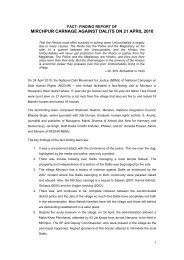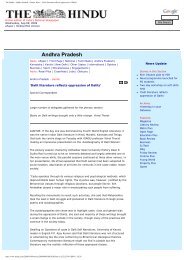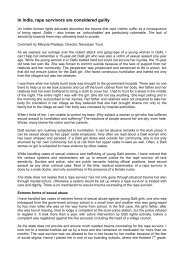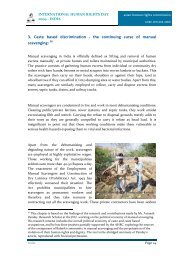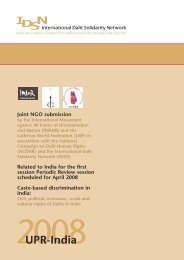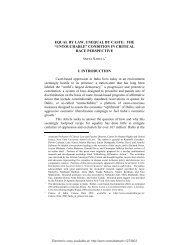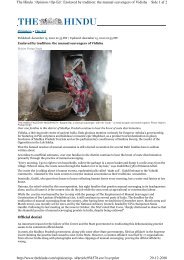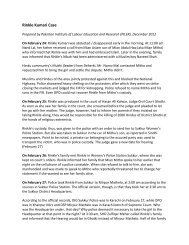A Global Alliance Against Forced Labour - International Labour ...
A Global Alliance Against Forced Labour - International Labour ...
A Global Alliance Against Forced Labour - International Labour ...
You also want an ePaper? Increase the reach of your titles
YUMPU automatically turns print PDFs into web optimized ePapers that Google loves.
A GLOBAL ALLIANCE AGAINST FORCED LABOURBasic purposes of prison labour118. There would appear to be consensus that workis an important part of the prison regime, and shouldbe beneficial to the prisoner rather than punitive innature. It is only one aspect of the broader prison regime,in which the core issue may be seen as ensuringsecurity while at the same time guaranteeing the protectionof prisoners.119. Subject to certain conditions, there are strongindications that many prisoners actively desire towork. Work provides relief from idleness, which isfrequently identified as the single most importantproblem in prisons. Prison disturbances can oftenbe attributed to the lack of adequate work opportunities.The recent increase in incarceration rates incertain countries has added to these problems, againmeaning that there may be too few jobs for prisonersto do. At its worst prison labour can be mundaneand repetitive, and may indeed be seen by prisonersthemselves as part of the punishment. Alternatively,it can involve more demanding tasks for external contractors,and can play a major role in facilitating postreleaserehabilitation. It is nevertheless a commonproblem that work and vocational training in prisonsin general are not adapted to opportunities in the externallabour market. Although work should have avocational purpose, it may be naïve to imagine that aprisoner can obtain a job based on these precise skillsafter release. The challenge for prison administratorsis to ensure that prisoners obtain transferable skills,so that they can compete on equal terms with freelabour upon release.120. There are continuing tensions as to the extentto which prisoners should work not only as part oftheir rehabilitation, but also for economic purposes.In several countries where there has been a strongemphasis on the cost effectiveness of penal reforms,prison labour has been seen as a means of defrayingthe costs of imprisonment.Minimum standards of protectionfor prisoners121. The ILO addresses aspects of prison labour inConvention No. 29. However, this instrument wasnot intended to deal with prison labour in a comprehensiveway. While prohibiting forced prison work forprivate benefit, it has no provisions regarding workin state-run establishments, and indeed exempts theright of the State to impose forced labour from its provisions.Other instruments of international law (generallyof a non-binding nature) address the overallconcerns of prison labour more directly. 42122. A key challenge is to ensure minimum standardsconsistent with human dignity for all prisonersat work, protecting them against economic exploitation.This involves at least minimum standards regardingwages, safety and health, and education aboutworkers’ rights. “Decent work for prisoners” may bea conceptual starting point. However, this obviouslycannot be defined in the same manner as for workersin the free market. Prison labour can never, for example,be described as completely free or voluntary.It may be preferable to talk in terms of a “constrainedconsent”, whereby prisoners are obliged to undertakesome form of activity, but have the option to choosefrom or negotiate a range of activities including education,skills training courses and work.123. It is important to place labour conditions,and also policy prescriptions regarding them, in anational context. In many developing countries prisonershave to work to secure their basic needs. Withliving conditions often at a subsistence level, the mainincentive for prisoners to work, most often in agriculturaltasks, is to satisfy their immediate basic needs.In the wealthier industrialized countries – where theState may be required to feed, clothe and providesuch amenities as heating for prisoners – the issuescan be different.124. A key issue is determination of wages and socialbenefits. In France, since the late 1980s prisonadministrations have negotiated the labour arrangementsfor prisoners with private contractors, on thebasis of the minimum wage. Prisoners in Franceare now estimated to have the highest productivityin Europe, at levels comparable to the free market.Both private companies and prisoners also contributeto social security payments, including health and maternitybenefits, retirement contributions, and workplaceaccident allowances.Approaches to control and supervision125. Monitoring the work regime of prisoners,whether in public or private establishments, can bea matter of obvious importance. The nature and degreeof supervision often depend on the prison’s location,the type of work involved and the securityrating of prisoners. Australia’s inspection system, forexample, operates autonomously and reports directlyto Parliament. The inspection model sets normativestandards based on ILO Conventions, as well asother international statutes and case law. It covers environmentalstandards, operational safety and healthand non-discrimination issues. A unique feature ofthe English 43 penitentiary system is the Prisons and42. For example, the United Nations Standard Minimum Rules for the Treatment of Prisoners, adopted by the First United Nations Congress onthe Prevention of Crime and the Treatment of Offenders, held at Geneva in 1955, and approved by the Economic and Social Council by itsresolution 663 C (XXIV) of 31 July 1957 and 2076 (LXII) of 13 May 1977. An interesting regional example is the European Prison Rules,Recommendation No. R (87) 3, adopted by the Committee of Ministers on 12 Feb. 1987 at the 404th meeting of the Ministers’ Deputies.43. The reference here is to England and Wales; the penitentiary systems vary in different parts of the United Kingdom.28



